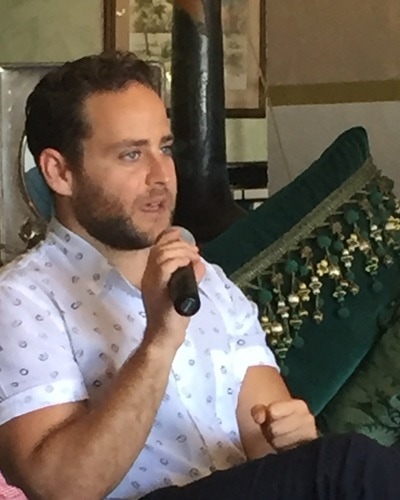|
by Rana Asfour Revised content:
BookFabulous would like to apologise for inadvertently having sent out the unedited version of this article to subscribers. Below is the revised version. Today saw a gathering of avid readers at a private literary salon in Dubai at which writer and author Saleem Haddad was star guest. The author of 'Guapa' - which means beautiful in Spanish - is a coming-of-age novel that deals with issues of identity, societal norms and expectations, homosexuality, dictatorship, rootlessness, the Arab Spring and familial relationships. For two solid hours the author fielded questions from the group who were also treated to a reading of the writer's favourite passage from the book. On his novel, Haddad said that he had never set out to write his book to start a discussion about homosexuality in the Middle East, although utlimately it is exactly what it ended up doing. His main reason for penning 'Guapa' he explained was to try and understand how a person finds his/her space in the world and to examine how the political ongoings of the Middle East mirror family relationships, gender and sexuality as well as what it means to be 'an Arab in American eyes' following the events of 9/11. Born in Kuwait City in 1983 to a Lebanese-Palestinian father and an Iraqi-German mother, Saleem Haddad was educated in Jordan, Canada, and the United Kingdom where he currently lives. He has also worked as an aid worker with 'Doctors Without Borders' and other organizations in Yemen, Syria, Egypt and Iraq. 'Because of my different travels and the different places I lived, I learnt a lot about myself and how differently people perceived me in different countries - as Arab, Christian, gay, etc. - Perhaps because of all my travels, I find the idea of rootlessness haunting, but I also feel that due to my diverse background, I have the history of an entire region inside of me and I felt I could write a novel set in the Middle East,' he explained to the audience. 'Guapa' is set over the course of twenty-four hours and follows Rasa, a gay man living in an unnamed Arab country, as he tries to carve out a life for himself in the midst of political and social upheaval. 'My novel is set in the Arab world. I chose not to name the country and to leave that ambiguous in order to avoid any pre-conceived ideas from the readers that they may have of a certain country if it were named. My novel highlights relationships within the LGBT community, so because of the vulnerability of this community in the Middle East, I was worried that setting the story in a specific country would expose its members to threats and danger and I didn't want that.' Unlike his character Rasa in the novel, Saleem is openly gay and is backed by family and friends - his mum was present at today's presentation - in spite of the fact that in most parts of the Arab world, homosexuality is not only 'shameful' but also punishable by law. However, the writer stresses, his novel is in no way an autobiography. 'Guapa' is a brave and confident novel and one thing it does not do is shy away from taboo writing when it comes to Rasa's sexual encounters with his male partners. In response to what some in the audience labeled as an 'unnecassary vulgar explicit scene' in the book in reference to Rasa's encounter with a taxi driver at the tender age of 14, he said: 'The taxi scene at the beginning of the book was a necessary one. I regard it as the only explicit scene in the entire book and I felt that it was very necessary that it be written that way. I cannot write a book about 'shame' (or 'eib' as it is known in Arabic) unless I transcend my own views and struggles with what is shameful to write. So the decision to include it in the book was a political and an artistic decision'. The novel also sheds light on the aftermath of a failed Arab Spring that resulted in crushing the dreams of a younger generation who had bargained on its success and all the 'freedoms' it promised to bring. Instead what ensued was a total dissolution of most, if not all, freedoms - particulary to members of the LGBT community - not to mention the ensuing concomitant political chaos and instability in the region. 'When the Arab Spring was taking place, I was studying abroad and all I wanted was to come back to the Middle East and be a part of what was going on. Now, however, it has become painful being an Arab in the Middle East where everyone is frustated and unhopeful. This is sadly the reality that we have to accept. Many places in the Arab World have become unlivable and corrupt. People, myself included, now realise that unless they are corrupt or have 'wasta' then they have no chance of advancing in their country. So, like me, they are choosing to leave'. 'But 'Guapa' is also a story about love which is also very political and very scary. By love, I am refering to all kinds of love; familial, love of country etc. It is also a novel filled with humour which is also quite a revolutionary and powerful act of resistance.' 'Guapa' is set over the course of twenty-four hours and follows Rasa, a gay man living in an unnamed Arab country, as he tries to carve out a life for himself in the midst of political and social upheaval. Rasa spends his days translating for Western journalists and pining for the nights when he can sneak his lover, Taymour, into his room. One night Rasa's grandmother—the woman who raised him—catches them in bed together. The following day Rasa is consumed by the search for his best friend Maj, a fiery activist and drag queen star of the underground bar, Guapa, who has been arrested by the police. Ashamed to go home and face his grandmother, and reeling from the potential loss of the three most important people in his life, Rasa roams the city’s slums and prisons, the lavish weddings of the country’s elite, and the bars where outcasts and intellectuals drink to a long-lost revolution. Each new encounter leads him closer to confronting his own identity, as he revisits his childhood and probes the secrets that haunt his family. As Rasa confronts the simultaneous collapse of political hope and his closest personal relationships, he is forced to discover the roots of his alienation and try to re-emerge into a society that may never accept him.
0 Comments
Your comment will be posted after it is approved.
Leave a Reply. |
Archives
March 2021
|







 RSS Feed
RSS Feed
